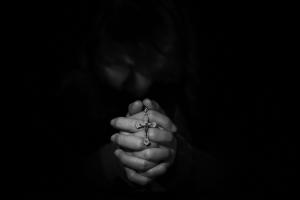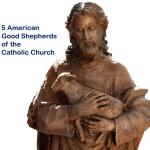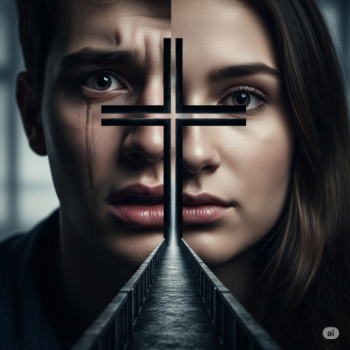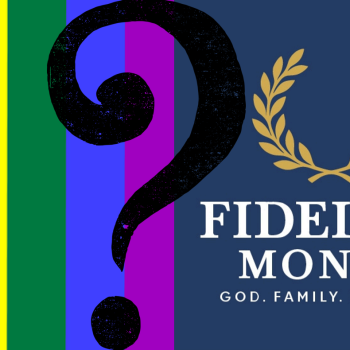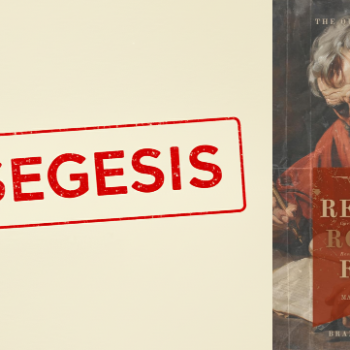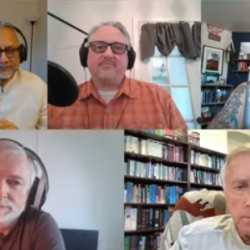Then Jesus said, “I came into this world for judgment, so that those who do not see might see, and those who do see might become blind.” Some of the Pharisees who were with him heard this and said to him, “Surely we are not also blind, are we?” Jesus said to them, “If you were blind, you would have no sin; but now you are saying, ‘We see,’ so your sin remains. John 9:39-41
The above verses come from the Gospel reading for the fourth Sunday of Lent. This extra long reading deals with a man blind from birth. Jesus heals him on the Sabbath. This leads the Pharisees questioning the former blind man and his parents. Obviously, the former blind man can see, but the nature of Jesus remains in question, especially since Jesus healed on the Sabbath. Eventually, the Pharisees throw the man out. Jesus later finds the man and asks him if he believes in “the Son of Man.” The former blind man asks who this “Son of Man” is. Jesus answered, “You have seen him…” The readings end with the passage above.
In this article, I reflect on the difference between those who claim, “to see” and the “blind” that see their sin and repent. Like the blind man, these sinners receive sight. For assistance, I turn to Fr. Robert McTeigue’s reflections on this Sunday’s reading from his Friday radio program on The Catholic Current. For anyone not familiar with this program, please take a listen. I find Fr. McTeigue’s insights very Chestertonian—that is, witty, while also insightful.
The “Seeing” Blind
The Pharisees in the passage above Jesus calls truly blind. They claim to see when in fact they do not. They refuse to see their own sin and therefore retain their sin. Fr. McTeigue reflects:
I have to see my sins and I have to see its effects, or I won’t be moved to repent and then I’ll be lost. It’s true for me, its true for everyone. And He said, “And He came so that those who do see might become blind.” So, He is not talking about those who really see, but those who claim to see is an illusion of their own righteousness. An illusion of their own self-sufficiency.
For some who present themselves as religious, the temptation becomes a reliance on one’s own works and righteousness. They often live as if they do not need God’s grace. Furthermore, like the Pharisees before them, they place unnecessary burdens on others. The blindness to their sin prevents them from confession and repentance. Therefore, as Jesus said, they remain in their sin.
Call the Tune and Have God Dance
Conversely, there also exists those within the Church who hold to another illusion—the possibility for the redefinition of sin. Sadly, some under this illusion (or delusion) include cardinals and even Church hierarchy in Germany. Fr. McTeigue continues:
An illusion of the nonsense that they can call the tune and have God dance. Those people who claim enlightenment are not only blind, but they also don’t even know that they are blind.
Those “who claim enlightenment” think they know better than the Church concerning sin. In this, they show their blindness to sin. Furthermore, they spread this blindness to others, eager for sin’s redefinition. Shepherds of souls should know better. How many will suffer eternally for this nonsensical illusion?
The Only Unforgiven Sin
The next few points from Fr. McTeigue deserve the utmost clarity. Therefore, I break them out accordingly.
Friends, the sin that can’t be forgiven is the one that is never repented over.
Such a simple, yet profound truth. Unless we acknowledge our sin as sin, we cannot repent of it. Likewise, if we think our sin as not sin, we cannot repent of it. Therefore, those who sin, yet think they do not, remain unrepentant in their sin.
If we confess our sins, he is faithful and just to forgive us our sins and to cleanse us from all unrighteousness. 1 John 1:9
Calling Sin Love
The sin that can’t be forgiven is the one we claim is no sin because now we’re calling it love. The sin that cannot be forgiven is the one not repented of as sin because we say things, such as, “my body, my choice,” or “the right to choose” or “pro-noun hospitality,” or “love is love.”
We see this most clearly in those within the Church who seek to bless sin in the name of “love.” The German Synodal Way (GSW) represents the epicenter of this breach of fidelity. By blessing sin in the name of “love,” the GSW bars the way to repentance in their claim of no sin and virtue in romantic same-sex relationships. Furthermore, a recently released document on gender identity released by the GSW stands in stark contrast to Church teaching on human sexuality and therefore places souls in jeopardy. Again, in the name of “love.”
All Creation is From Him and for Him
The eternal Father has spoken His Word, the Logos, and all creation is from Him and for Him. And if we choose not to see by the light of Christ, we will only have darkness.
All who live in darkness, whether the outwardly religious or those who seek to redefine sin, fail in understanding that “it” is not about them. Self-righteousness and the redefinition of sin reflect two sides of the same illusionary coin. This coin, flipped in darkness, offers no hope—only despair as those who carry it remain in their sin.
Clarity in Our Final Judgement
And the horror of our final judgement will be the undeniable clarity that when we had to choose between light and darkness, we chose darkness—because we loved our sin. We loved our sin more than we loved God. We loved our sin even more than we loved ourselves. And that is the worst kind of blindness, as self-inflicted blindness.
Furthermore, while we may deceive ourselves in this life, eventually, clarity comes in the form of our final judgement. At our final judgement, all darkness scatters and exposes all truth in the light of Christ, as “God is light, and in him is no darkness at all.” What we truly loved and valued becomes clear. Our final judgement shows if we loved our sin (darkness) more than God (light). It shows if we loved our sin more than ourselves. Therefore, we ultimately choose to suffer eternally because we inflicted this blindness to sin ourselves.
A Final Plea
In conclusion, to restate the truth of this article: “the sin that can’t be forgiven is the one that is never repented over.” Whether one thinks themselves as without sin or we attempt to redefine it, if we fail to repent of our sins, we eventually die in them. Let us love light over darkness. Jesus stands ready to heal our self-inflicted blindness and forgive our sins. But first we must acknowledge our sins and step into the light.
If you enjoy my writing and want to support my work, please consider donating a monetary gift of any size or quantity by clicking here. Thank you!
Read my other writing here.
Please click the link below to join.
Voices of the Faithful in the Synod on Synodality
Please make your voice heard.
I Support Church Teaching in the Synod of Synodality
